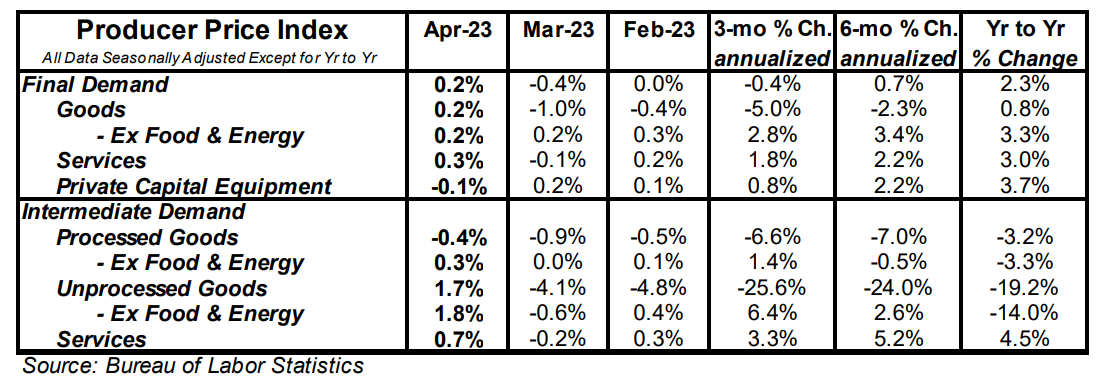- The Producer Price Index (PPI) rose 0.2% in April, coming in below the consensus expected +0.3%. Producer prices are up 2.3% versus a year ago.
- Energy prices rose 0.8% in April, while food prices declined 0.5%. Producer prices excluding food and energy rose 0.2% in April and are up 3.2% versus a year ago.
- In the past year, prices for goods are up 0.8%, while prices for services have risen 3.0%. Private capital equipment prices declined 0.1% in April but are up 3.7% in the past year.
- Prices for intermediate processed goods fell 0.4% in April and are down 3.2% versus a year ago. Prices for intermediate unprocessed goods rose 1.7% in April but are down 19.2% versus a year ago.
Implications:
Producer prices bounced back from a steep decline in March to rise 0.2% in April, while the twelve-month comparison moderated to 2.3%. As you can see from the nearby chart, the year-ago comparison for producer prices has been moderating since the 11.7% peak in March 2022. Part of the moderation in April can be explained by an outsized jump in inflation in March 2022, when the invasion of Ukraine started, rolling off the year-ago comparison. While this continued moderation is welcome news, data from today coupled with yesterday’s CPI report shows the Federal Reserve’s job in taming inflation is not over. The futures market currently expects a series of rate cuts starting in the third quarter; we don’t think the data validate these expectations, and the Fed’s failures in the 1970s should be a stark reminder of the painful ramifications of easing before the battle is fully won. Taking a look at the details of today’s report shows that the services sector led prices higher in April, rising 0.3% and accounting for eighty percent of the rise in the overall index. Meanwhile, goods prices increased 0.2% in April, on the back of higher costs for gasoline (+8.4%) which was partially offset by a 37.9% drop in prices for chicken eggs. Prices further back in the pipeline were a mixed bag, as prices for intermediate demand processed goods fell 0.4% while unprocessed goods snapped back 1.7% after a string of outsized declines. Signs of easing pressures are a positive, but it’s clear we aren’t at the finish line yet. In other news this morning, initial unemployment claims rose 22,000 last week to 264,000. Continuing claims rose 12,000 to 1.813 million. These figures are consistent with a slowing in job gains.





